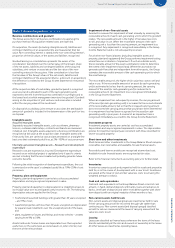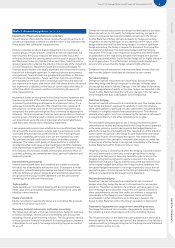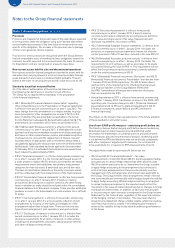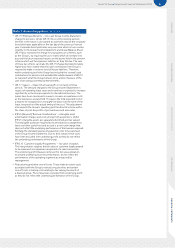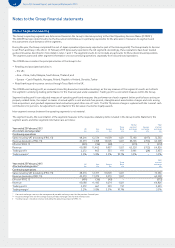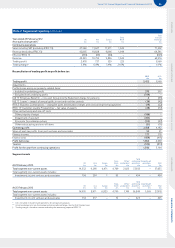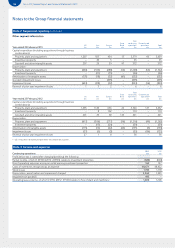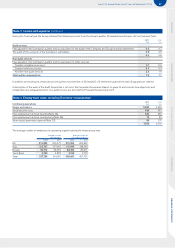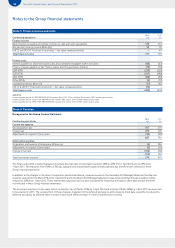Tesco 2013 Annual Report Download - page 82
Download and view the complete annual report
Please find page 82 of the 2013 Tesco annual report below. You can navigate through the pages in the report by either clicking on the pages listed below, or by using the keyword search tool below to find specific information within the annual report.
78 Tesco PLC Annual Report and Financial Statements 2013
Notes to the Group financial statements
(‘PPI’) customer redress and evidential provisions to the FCA Handbook
with an implementation date of 1 December 2010. TheGroup continues
to handle complaints and redress customers in accordance with PS
10/12. This will include ongoing analysis of historical claims experience
in accordance with the guidance.
The calculation of these provisions involves estimating a number of
variables, principally the level of customer complaints which may be
received and the level of any compensation which may be payable to
customers. The number of cases on which compensation is ultimately
payable may also be influenced by the outcome of the analysis of
historical claims referred to above. A change in the estimate of any
of the key variables in this calculation could have the potential to
significantly impact the provisions recognised.
Insurance reserves
Until October 2010 all Tesco Bank branded products were underwritten
through the RBS Insurance partner. From November 2011 all general
insurance policies sold under this arrangement had expired. A final
termination settlement agreement executed on 26 September 2012
provided a final claims reserve determination and resulted in the full
and final agreement of a concluding commission statement. The
consideration received by the Group fully satisfied any and all liabilities
of RBS Insurance (subsidiaries, affiliates and agents) to the Group.
Insurance reserves in relation to motor and insurance products sold
by the Group since October 2010 are held predominantly within Tesco
Underwriting Limited.
Post-employment benefit obligations
The present value of the post-employment benefit obligations depends
ona number of factors that are determined on an actuarial basis using
anumber of assumptions. The assumptions used in determining the
netcost (income) for pensions include the discount rate. Any changes in
these assumptions will impact the carrying amount of post-employment
benefit obligations.
Key assumptions for post-employment benefit obligations are disclosed
in Note 26.
Adoption of amended International Financial Reporting
Standards
The Group has adopted the following amended standards as of
26 February 2012.
• IFRS 7 (amended) ‘Financial instruments: disclosures’
• IAS 12 (amended) ‘Income Taxes’.
The adoption of the above amendments has not had any significant
impact on the amounts reported in the Group financial statements but
may impact the disclosure for future transactions and arrangements.
Revenue
Revenue comprises the fair value of consideration received or receivable
for the sale of goods and services in the ordinary course of the Group’s
activities.
Sale of goods
Revenue is recognised when the significant risks and rewards of ownership
of the goods have transferred to the buyer and the amount of revenue
can be measured reliably.
Revenue is recorded net of returns, discounts/offers and value added taxes.
Provision of services
Revenue from the provision of services is recognised when the service
is provided and the revenue can be measured reliably, based on the
terms of the contract.
Where the Group acts as an agent selling goods or services, only
the commission income is included within revenue.
Financial services
Revenue consists of interest, fees and income from the provision
ofinsurance.
Interest income on financial assets that are classified as loans and
receivables is determined using the effective interest rate method.
Calculation of the effective interest rate takes into account fees
receivable that are an integral part of the instrument’s yield, premiums
or discounts on acquisition or issue, early redemption fees and
transaction costs.
Fees in respect of services (credit card interchange fees, late payment
and ATM revenue) are recognised as the right to consideration accrues
through the provision of the service to the customer. The arrangements
are generally contractual and the cost of providing the service is incurred
as the service is rendered.
The Group generates commission from the sale and service of Motor
and Home insurance policies underwritten by Tesco Underwriting
Limited, or in a minority of cases by a third party underwriter. This is
based on commission rates which are independent of the profitability
of underlying insurance policies. Similar commission income is also
generated from the sale of white label insurance products underwritten
by other third party providers.
The Group continues to receive insurance commission arising from
the sale of insurance policies sold under the Tesco brand through the
legacy arrangement with RBS. This commission income is variable and
dependent upon the profitability of the underlying insurance policies.
Clubcard, loyalty and other initiatives
The cost of Clubcard and loyalty initiatives is part of the fair value of the
consideration received and is deferred and subsequently recognised over
the period that the awards are redeemed. The deferral is treated as
a deduction from revenue.
The fair value of the points awarded is determined with reference to the
fair value to the customer and considers factors such as redemption via
Clubcard deals versus money-off-in-store and redemption rate.
Tesco for Schools & Clubs vouchers are issued by Tesco for redemption
by participating schools/clubs and are part of our overall Community
Plan. The cost of the redemption (i.e. meeting the obligation attached
to the vouchers) is treated as a cost rather than a deduction from sales.
Rental income
Rental income is recognised in the period in which it is earned,
in accordance with the terms of the lease.
Finance income
Finance income, excluding income arising from financial services,
is recognised in the period to which it relates using the effective
interest ratemethod.
Finance costs
Finance costs directly attributable to the acquisition or construction
of qualifying assets are capitalised. Qualifying assets are those that
necessarily take a substantial period of time to prepare for their intended
use. All other borrowing costs are recognised in the Group Income
Statement in finance costs, excluding those arising from financial
services, in the period in which they occur. For Tesco Bank, finance
cost on financial liabilities is determined using the effective interest
rate method and is recognised in cost of sales.
Note 1 Accounting policies continued













